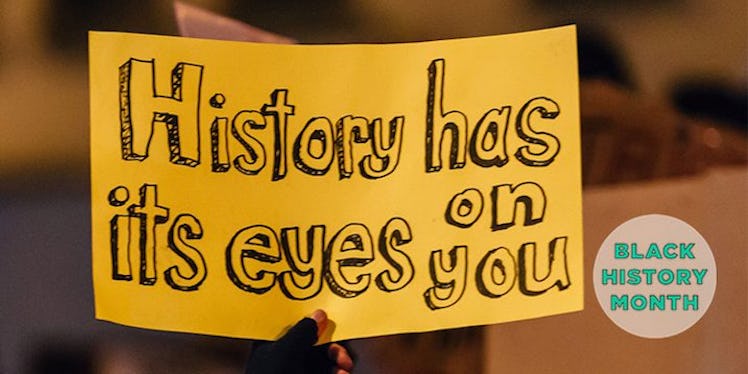The early days of Donald Trump's presidency have a lot of people (read: minorities) fearful for what he may do next.
The first day after his inauguration, a movement was started by incensed white women. Thus began "the resistance."
By the middle of the first week, the conversation revolved around Trump and Hispanic immigration, and it carried its usual offensive rhetoric.
By the weekend, his White House flirted with Holocaust denial, therefore upsetting even Republican Jewish groups.
And that was all before he rolled out a policy that many received as a wholesale rejection of Muslim immigrants.
As a member of a marginalized group myself, my initial reaction has been to empathize with all of the above. But as a member of specifically the most marginalized group in American history, I can't help but point out how much this feels like uncharted territory.
For all the fears regarding how terrible Trump's election would be for African-Americans, Trump has not, in fact, "come after" black people in any obvious way during his young presidency.
And yet, I know better than to take comfort in that fact.
Instead, I'm more inclined to react the way ESPN's Bomani Jones did on his radio show on Monday: "He ain't talkin' about me, yet."
"Yet" will always be a necessary addition. Being black and educated on black history makes it impossible to ignore the signs pointing to "yet."
And regardless of what Trump has yet do, those signs are abundant and obvious.
Trump has insisted he'll be the president of "law and order." But being black makes me dread what presidents like Nixon have actually meant when they've use those words: an increase in arrests, and even less fairness in a criminal justice system already targeted at black people.
Trump's nominee for Attorney General, Jeff Sessions, is touted as a strong advocate of the police. Being black and aware of this abuse of power leaves me with absolutely little hope that the Department of Justice will continue to demand reform from police departments around the country, despite recent investigations indicating there should be more of that reform.
The fact that Sessions is a proven opponent of the Voting Rights Act – the crowning achievement of the Civil Rights Era – leaves me with even less hope there will be an effort to fight against the type of discriminatory voting laws that – in the words of one federal judge – "target African Americans with almost surgical precision."
In fact, with Trump insisting that "millions" voted illegally in the general election – as well as his press secretary suggesting such fraud could have occurred in "urban" areas, there is even more of a reason to assume there will be even more discriminatory voting laws coming in the future... not less.
Trump talks about cutting regulations in order to help grow the economy. But being black and aware of how black people are already discriminated against within the housing industry (even with regulations intended to curb that practice) means dreading an increase in predatory lending, as well as even more obstacles for black families trying to build their wealth.
Regardless of how, when or why, an impediment to black people's efforts to progress will come.
It may not have happened yet, but being black makes me sure we're next.
